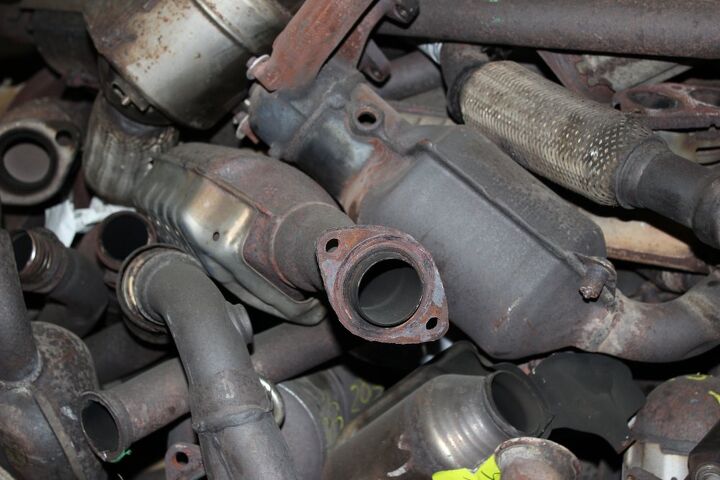
On Sunday, California Governor Gavin Newsom signed new legislation designed to prevent catalytic-converter thefts. The auto part has become a preferred target for criminals, especially on the West Coast, due to its high content of precious metals and relative ease of removal. Last year, more than 18,000 units are believed to have been hacked off in California alone and the issue only seems to be getting worse.
The law seeks to impose stricter penalties on thieves and adds a new $1,000 fine that multiplies itself every time someone is caught sawing on an exhaust pipe without the owner’s permission. But it also establishes rules that effectively make it illegal to purchase auto parts from anyone other than a licensed dealer or the vehicle’s current owner.
This requires that recyclers keep comprehensive records of any catalytic converters that come into their possession, lest they face penalties of their own – starting with a suspension that would put them temporarily out of business. Purchasers will now need to keep a written agreement signed by the seller, along with the agreed-upon price for a period of two years. Additionally, buyers will need to have copies of any unique ID numbers and/or original vehicle identification numbers which California says will now need to be etched onto the parts.
While this may make it harder to move ill-gotten catalytic converters, it also sets the stage for serialized automotive parts. The upside to this is that they’ll be easier to track and regulate. However, the right-to-repair movement has cautioned that such initiatives could potentially strengthen pre-existing ties between automotive manufacturers and the government, stifle at-home mechanics’ ability to source parts from junkyards, and create new controls that may help OEMs to monopolize the aftermarket industry.
But the fact remains that converter thefts have become a serious problem over the past 48 months and the best solution thus far has been to avoid buying anything with a lot of ground clearance or literally wrapping your exhaust pipe with braided steel that’s harder to cut through. As much as I want to back the right-to-repair movement, additional actions may need to be taken unless California is going to be cool with people running cat-free exhausts. Though something tells me that the most emissions-obsessed state in the Union probably isn’t willing to compromise on that, especially when the new rules mean more opportunity for regulation.
According to the Los Angeles Times, California actually introduced a full suite of bills designed to address the staggering increase in thefts. Senate Bill 1087, by state Sen. Lena Gonzalez (D-Long Beach), and Assembly Bill 1740, by Assembly member Al Muratsuchi (D-Rolling Hills Estates) are the ones that increase penalties for buyers who fail to certify with the government that a catalytic converter wasn’t stolen. These are being mimicked by other states, with over 100 individual pieces of pending legislation existing elsewhere in the country.
With State Farm insurance reporting that catalytic converter theft grew almost 293 percent nationwide by the summer of 2021 – one year after the initial spike in theft – it’s easy to see why states would want more protection. But none of the legislation really addresses the root issue. Thefts didn’t increase because someone realized that catalytic converters were valuable and relatively easy to steal. They jumped because the economy entered into a period of severe duress and gave way to increased levels of crime in general. Worse yet, the extensive paper trail that’s at the heart of most of the resulting legislation only helps when a catalytic converter is being resold. Units being held for a period of over two years or immediately torn apart so the individual materials can be smelted down for profit likely won’t be impacted by the new rules – so the best case scenario is that the new laws discourage thieves while making stolen converters a little harder to flip overnight.
[Image: fru-fru/Shutterstock]
Become a TTAC insider. Get the latest news, features, TTAC takes, and everything else that gets to the truth about cars first by subscribing to our newsletter.

